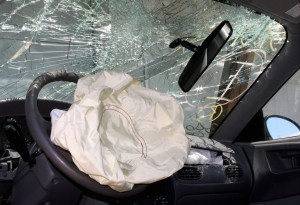As Takata pleaded guilty and agreed to pay a $1 billion in restitution, compensation and fines, one issue remains in doubt: What role did the automakers play?
If you listen to the car companies, they are victims as well. In fact, the settlement agreement shows them receiving $825 million due to Takata’s carelessness.
The airbag inflators can explode with too much force in certain conditions, hurling shrapnel into the vehicle cabin. The result is 16 deaths and nearly 200 injuries worldwide. It forced the largest recall in U.S. history: 42 million vehicles.
However, there is a contingent of vehicle owners, victims and their families who claim five automakers using the faulty airbags are every bit as culpable as Takata. Through their attorneys, the believe the automakers knew the airbags were defective, but continued to use them anyway to save money.
(Takata to plead guilty, set up victims fund. Click Here for details.)
Plaintiffs filed dozens of lawsuits in Miami claiming that Honda, Nissan, Ford, BMW and Toyota knew the inflators were faulty yet used them anyway. In a filing, it’s noted that an unidentified automaker described the faulty inflator problem as “one in which a passenger protection device was transformed into a killing weapon,” the Associated Press reported.
“The automotive defendants were aware that rupture after rupture, both during testing and in the field, confirmed how dangerous and defective Takata’s air bags were,” the plaintiffs’ attorneys said in the filing.
They contend that Honda saw airbag inflator ruptures in 1999 and 2000 while Toyota expressed concerns about Takata’s quality in 2003. They also note that Ford entered into a deal with Takata over the concerns of its airbag expert and Nissan and BMW were seeking cost savings of about $4 per unit by using Takata’s inflators.
(Another Takata recall impacts 13 automakers. Click Here for the latest.)
Conversely, the automakers – 19 in all – have consistently maintained they were unaware of the problem. The Justice Department said Takata got automakers to continue buying its inflators “through submission of false and fraudulent reports and other information that concealed the true and accurate test results.”
The plaintiffs are suing not only over the deaths and injuries but over what they say is the vehicles’ loss in value because of the defect. They asked U.S. District Judge George Caram Steeh to delay the sentencing on the case.
They’re concerned that the wording of the plea agreement makes the automakers appear as if they were victimized as well. If so, it would weaken their arguments in future lawsuits. Steeh denied the request.
(Honda’s Takata problems continue with recall of 1.29 million vehicles. For more, Click Here.)
“Whether the OEMs (automakers) have a role as culprit in addition to victim is something that can be resolved through the litigation process,” he said.

